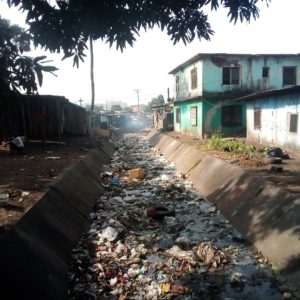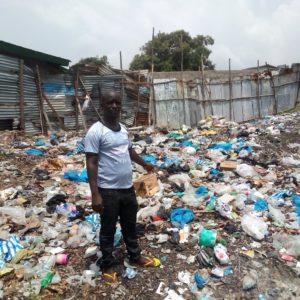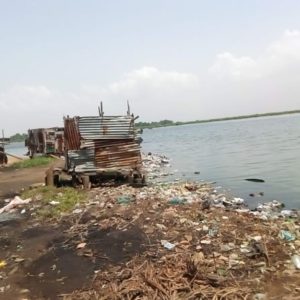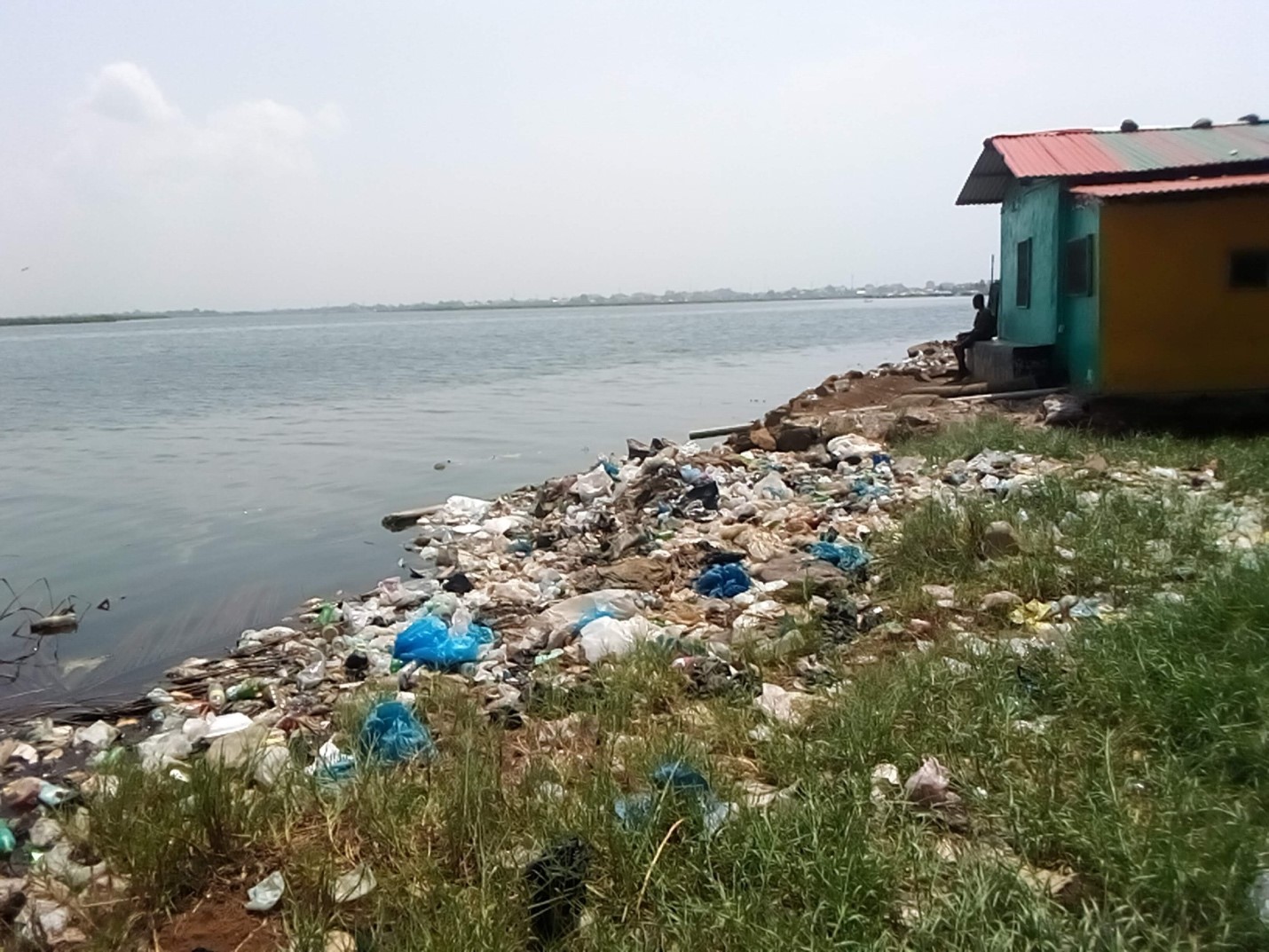PHOTO: Residents in Slipway dump on the bank of the Mesurado river
BUZZI QUARTER, Monrovia – As the growing waste and sanitation problem in Monrovia became part of a diplomatic dispute this month, people in slum communities said they didn’t care who solved the problem as long as they get some relief from what many say is now a major health and environmental crisis.
United States Ambassador Michael McCarthy voiced the exasperation many in the diplomatic community feel at mounting evidence of corruption and the Government of Liberia’s failure to take responsibility for crisis. In an opinion piece that noted US taxpayers spend $110m a year in Liberia, he asked “Is there a more basic local government responsibility than the collection and proper disposal of garbage?”
Mayor Koijee has since responded that the ambassador misconstrued his statement that donors had failed to pay for water and sanitation services, saying the Weah administration remains committed to tackling the problem. He also blamed citizens for not playing their role in keeping the city clean. Mayor Koijee said the people had the “wrong mindset” and “believe solid waste management within the City is a government’s business and not theirs.”
It is true that donor funding to the problem has been substantial in the past – Mayor Koijee put the figure at $5.9m a year before he took office – but donors are frustrated by the administration’s failure to use that funding to develop sustainable management on its own.

Monrovia’s biggest drainage, the Soinwein, here residents use the drainage for defecation and garbage disposal
While donors and government argue about who should take responsibility, on the front lines of Monrovia’s waste crisis, people are paying the price. A new viral rap song and video called Trash on the Beach by Spiral Joel is giving a voice to their frustrations.
Larwo Mulbah has battled with smoke from garbage set ablaze by residents at the dumpsite near where she lives here in this slum community for six years.
Residents burn the waste to get rid of it and the bad odor it emits.
“Smoke can be too much. The smoke can be all in our rooms. It can be hard for us to see clearly,” said Madam Mulbah.
The constant inhalation of smoke, filled with toxic chemicals from the plastics and other substances being burned, has resulted in Madame Mulbah contracting asthma, a chronic lung disease that causes airways to swell and which can lead to death.
Buzzi Quarter is one of the many slum communities in Monrovia that battle with inadequate waste disposal. Monrovia’s rapid growth since the end of the war in 2003 means slum-dwellers make up 70% of the city’s population, according to the Cities Alliance report. Instead of being collected and taken away to a landfill or processing plant, residents leave waste in dumpsites in their communities.

A dumpsite in Buzzi Quarter. Terry Johnson explains the impact of the trash on the environment
Chemicals inhaled from the smoke are one of the major problems damaging the health of people here. Improper waste management can also lead to a host of other illnesses. Uncollected waste serves as a breeding ground for mosquitoes, flies, rats, and cockroaches that transport viruses and bacteria to people. They transmit malaria, cholera, typhoid, and dysentery, according to the U.S. Centers for Disease Control and Prevention.
“It’s unfair to them [the slum dwellers] when it comes to their health,” said Joyce Kilikqoo, Executive Director of the National Public Health Initiative of Liberia. “They have increased mosquitoes that lead to malaria, they have increased flies and flies transport bacteria to their food.”
Malaria is a leading cause of illness and death in Liberia, accounting for 46.9% percent of hospital outpatients in 2020, according to the World Health Organization. Diseases such as dysentery and typhoid are widespread. Diarrhea affects more children under 5 in Liberia than anywhere in the world.
“I have only spent six months here and every time I carry my three children for treatment, doctors say it’s malaria. You can’t even sit outside during the day and night because of the mosquitoes,” said Victoria Isaac, a tenant in Slipway, another slum.
Plastic is also a major problem. Without enough wells and hand pumps, people are forced to buy clean water for LD10 for a gallon. People drop the emptied plastic sachets on the ground wherever they are. Plastics end up in the environment blocking waterways, drains and leaching harmful chemicals into the soil.
Slums in Monrovia are mostly informal settlements with limited housing and squalid living conditions. They are overpopulated with many people squeezed into small rooms built without any urban planning or adherence to zoning regulations.
Slum communities often lack basic services like toilets and water and have little access to sanitation, making them vulnerable to communicable diseases.
“Nationwide, our most common disease we have in Liberia is malaria and that is because of the way we maintain our environment,” said Dr. Moses Pewee, former Director of Communicable Disease, Ministry of Health. “Garbage overstayed in the environment becoming a home for mosquitoes and flies. We need to keep our environment clean.”
But that’s not so easy in communities that don’t have enough toilets or any garbage disposal options. Open defecation is a common practice. Others use makeshift toilets and public latrines.
Open defecation pollutes the environment and affect water sources from hand pumps, wells, rivers and waterways. Community dwellers with no knowledge of the danger of open defecation use these water sources for drinking, cooking and bathing. It results in waterborne diseases such as cholera, typhoid and diarrhea.
“Landlords built houses without a toilet but charged $US20 per room and we are paying $LD10 for government toilet,” said Jerry Tweh, a tenant in Soinwein, a slum community in Central Monrovia. “We take bath in the night and not in the day or wake up very early around 5-6 am to bath.”
“Only a few homes here have toilets and bathrooms,” Chairman Johnson conceded. “The majority use the public restrooms, which is three. It is not easy here. I am not going to lie, open defecation takes place here and the product ends up in the garbage pile, which is then poorly disposed of. Sometimes, the Center Street drainage, which runs through Soinwein drainage, is used for defecation and dumping of waste.”
Bob Robertson, Director for City Planning at the Monrovia City Corporation, claims the Corporation forbid landlords from building homes without latrines and says the MCC has been fining landlords for violations. But the News Public Trust saw many recently built homes without latrines.
Slipway is another Monrovia slum community, situated along the Mesurado River near Providence Island. Here only a few people burn garbage but the vast majority dump it along the riverbank and use the river as a latrine. Those whose homes have toilets end up running their sewage in the river or use makeshift toilets.

Residents in Slipway dump their waste on the bank of the Mesurado river and build makeshifts toilets that runs in the river.
Most of the people living in slums do not have regular jobs and have very little income. Most say they would not stay in the slum if they could make a living anywhere else. Many came here during the war; others have come since then as Liberia’s population has exploded. As climate change makes subsistence farming harder, experts warn these slums might grow even larger.
Kemah Feikai, 60, said she found herself in Slipway as a result of the war. 16 years ago, she was chased by rebels from her home in Gbarpolu County to Monrovia.
“I pay $LD1, 000 per month for rent. We are suffering here in a bad way for water and toilets,” said Madam Feikai. “We take bath behind our house. The landlord don’t even have time for that one, he only comes to collect his money and go and some of us we jammed, we don’t have anywhere to go, so we’re forced to pay and cover our mouth.”
Acarous Moses Gray is the District representative for Soinwein, Buzzy Quarter, and Slipway communities. Many people here blame Gray, a member of President George Weah’s Congress for Democratic Change political party, for failing to address their plight.
For more than nine years, Josephine Kollie, a tenant in Slipway has suffered from the stinking odor in Slipway due to open defecation but cannot leave the area because of high rent elsewhere.
She said the community leaders have sent several letters to Rep. Gray about the conditions but he has failed to intervene or even visit them to see for himself.
When contacted to respond to the accusations, Hon. Gray agreed to an interview with the Daily Observer on March 21, 2022 but later said he was not feeling well. Since then Hon. Gray has not responded to text messages and calls from this reporter.
Ambassador McCarthy’s opinion piece reflected donors’ frustration that years of tens of millions in funding has not translated into a functioning waste removal service program.
One project, for example, funded by the European Union helped Cities Alliance loan $US3,000 to 19 community business enterprises and two private businesses to build a business that collects solid waste from households and businesses in Monrovia. This effort has failed in part because customers refuse to pay.
Council taxes or fees for public services such as WASH are standard in other countries. But Monrovians have been resistant to paying. Some told the News Public Trust that they simply can’t afford to pay for garbage disposal while they are struggling to feed themselves. Some prefer giving it to unemployed youths, known as zogoes, to throw along the main roads and streets.
But according to J. Saah Joe Kendamah, head of the National Association of Primary Waste Community-Based Enterprises (NACOBE) said some of the blame goes to the MCC for failing to provide disposal sites for the CBEs to dump the trash after they collect it.
Kendamah also blamed the municipal government for failing to put measures in place to compel residents to pay for their waste.
Frederick W. Cole, Director for Services Program at the Monrovia City Corporation, admitted that Monrovians have refused to comply with the CBEs in part because the City Corporation does not have any policy to force people to pay for trash disposal.
“That policy will be able to guide everyone but as it stands there is no national solid waste policy so people are not used to paying for garbage,” he said.
The standoff over payment appears to have prevented the MCC from even providing a waste collection sites in communities and there is widespread lack of awareness of the waste plans. Isaac Karh, leader of the Slipway community, said he cannot stop people from dumping and defecating along the Monserado River because the Monrovia City Corporation has failed to provide a dumpsite for them.
Abayomi Grant, Waste Management Officer at the Environmental Protection Agency, echoed the mayor’s statement. “All communities are faced with water and sanitation problems, not only slum dwellers. As you can see, the streets are littered with waste, you choosing to see and flowing out into the streets, you see people littering the street with plastic bags, the marketplaces are all filled.”
Speaking before the US ambassador’s condemnation the MCC also told the Daily Observer that the problem was donor failure.
Leemu K. Tarpeh, WASH officer at the Montserrado County Office, said people need to take care of themselves and the environment.
“There is no budget set for the WASH department. Our work is supported by partners and once they select a particular community that’s where we will work. We are just encouraging our people to manage and take care of their environment,’’ said Tarpeh.
It seems clear donors will not step up to solve the problem any time soon. As the presidential election approaches next year the garbage crisis threatens to become an election issue.
This story was a collaboration with New Narratives as part of its Climate and Environment Reporting Project. Funding was provided by the UK Foreign Commonwealth and Development Office and the American Jewish World Service. The funders had no say in the story’s content.

